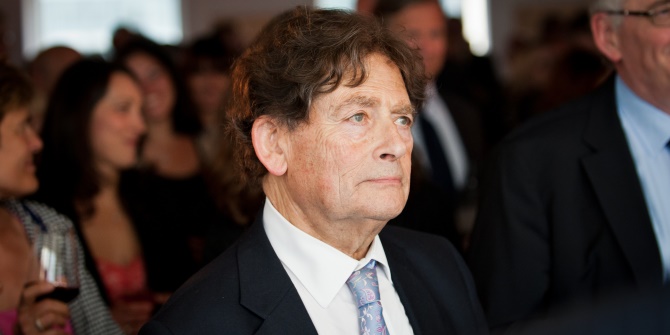 In this article, Mary Evans argues that the discursive justifications of austerity and touting of the moral certainty of markets advanced by politicians hide the fact that capitalism’s crises are always borne by the poor and the weak.
In this article, Mary Evans argues that the discursive justifications of austerity and touting of the moral certainty of markets advanced by politicians hide the fact that capitalism’s crises are always borne by the poor and the weak.
It has long been taken for granted, by Marxists and non-Marxists alike, that living in and with capitalism can be something of a roller coaster. Sometimes it’s up and sometimes it’s down. It’s not difficult to understand the economic reality that makes this bumpy ride so much a part of the history of the nineteenth, twentieth and twenty-first centuries.
But what is equally consistent, though rather more difficult to understand, is quite why so many people, in so many countries, are convinced that this is the only way to live. Nor is it easy to understand why so many people are so prepared to accept the tired old clichés about the necessity of ‘belt tightening’ or, even more fancifully, that ‘we are all in this together’ that constitute the rhetoric of the legitimation of austerity. At no point, in any of the recurrent ‘crises’ of capitalism, has it been the case that the richest have borne the greater share of hard times.
These questions are especially relevant at present, not least to those most affected by the politics and the policies of austerity. Across much of Europe, various forms of misery and anxiety have been inflicted on those most vulnerable to both cuts in state spending and changes in the state allocation of benefits. The UK as a whole has not suffered the same kind of cuts that have been the lot of Greece, but that is scarcely a comforting thought to those many people in this country who have nevertheless had their lives made increasingly precarious. It is not a good time to be unable, for whatever reason, to be in paid work or to be responsible for the care of others. To be blunt – looking after other people and being unable to work are two conditions which have been made into pathological, socially unacceptable situations. Being vulnerable has become unacceptable.
We can, in part, explain this by the rising popularity of neoliberal ideals about the primacy of the market, the value of all kinds of competition and the importance of diminishing, as far as possible, the role of the state as an institution of support, if not of regulation. ‘Masters of the Universe’ – to borrow the title of the book by Daniel Stedman-Jones – love to compete. They have no problem equating the individual freedom to compete in the economic market with human freedom. In their view, the rat race is an important, essentially ‘good’ and worthwhile race and those not wishing to join or endorse it are ‘losers’ or, even more problematically, are people who have turned their backs on the so-called ‘natural’ human inclination to compete. This is in essence the same tradition in which Margaret Thatcher re-interpreted the parable of the Good Samaritan in a way entirely sympathetic to capitalist accumulation.
So the world as the new Masters of both the Universe and Austerity see it is a world that is, in some very curious sense, a ‘natural’ world – the ‘real’ world. The political passion for reclaiming the moral certainty of the market and the capitalist order was generated by Thatcher and Ronald Reagan, but more recent politicians have taken it up with renewed vigour, claiming for themselves a language about ‘choice’, ‘empowerment’ and ‘flexibility’. Many of those who speak this language fail to recognise, let alone point out, that the words that they use apply largely to themselves and to the privileged, whilst increasing numbers of people in populations all across Europe are left with no access to any of these possibilities.
Further, and sometimes quite shamefully in terms of the previous history of the Conservative Party and its implementation of Clause 28, Tory politicians will cite neoliberal toleration for a range of sexualities. The very people, and the very political party, which were so adamant in their condemnation of anything except ‘compulsory heterosexuality’, have now discovered the political advantage of becoming sexual liberals.
It is difficult to type the above without damage to the key board on which it is being typed. Perhaps, and hopefully, many other people feel the same: living in a country which attempts to evict people from their homes because they have one too many bedrooms or – even worse – cuts the benefits provided for disabled people is surely a form of shared shame. The same can be said of a public discourse invaded by the nonsense that ‘we are all in this together’.
Various commentators, Owen Jones and Zoe Williams for example, have recently spoken and written about the need for a new form of politics. A first building block for that form of politics should be a rejection of the rhetoric through which austerity is legitimated. We could then move on to a discussion of the ways in which we might end that link through which those with the least always encounter the worst of the rocky rides of capitalism.
Note: This article was originally published on the SPERI Comment blog and gives the views of the author, and not the position of the British Politics and Policy blog, nor of the London School of Economics. Please read our comments policy before posting.
 Mary Evans is a Centennial Professor at the LSE, based at the Gender Institute. She has written on various aspects of gender and women’s studies and many of those publications have crossed disciplinary lines between the social sciences and the humanities. She was a founding editor of the European Journal of Women’s Studies and is presently working on a study of narratives – and continuities – of class and gender. Her latest edited book is Gender (Routledge, 2010).
Mary Evans is a Centennial Professor at the LSE, based at the Gender Institute. She has written on various aspects of gender and women’s studies and many of those publications have crossed disciplinary lines between the social sciences and the humanities. She was a founding editor of the European Journal of Women’s Studies and is presently working on a study of narratives – and continuities – of class and gender. Her latest edited book is Gender (Routledge, 2010).







